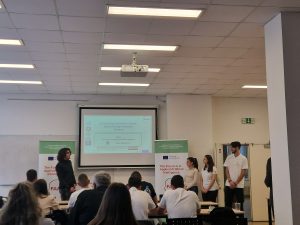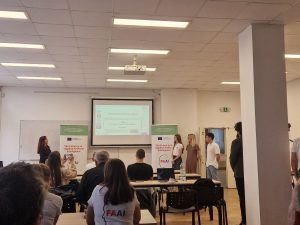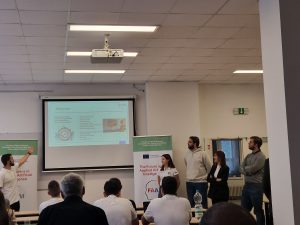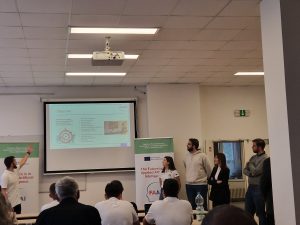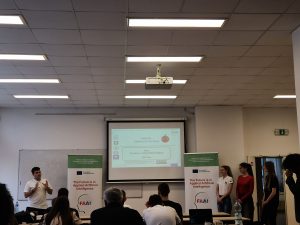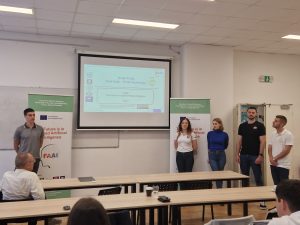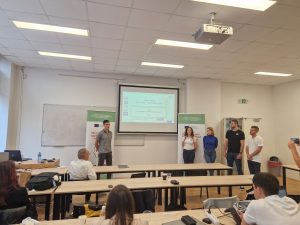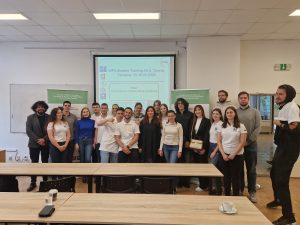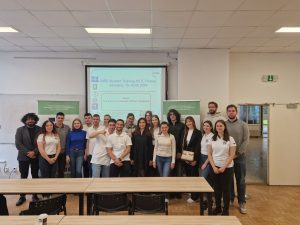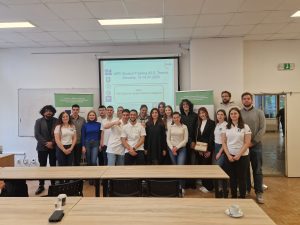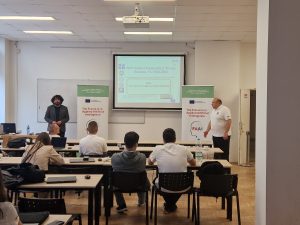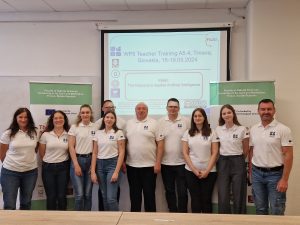A5.5: Student training on AAI
Student Training A5.5 in Trnava, Slovakia
Dates: May 15-19, 2024
Location: University of Ss. Cyril and Methodius in Trnava, Slovakia
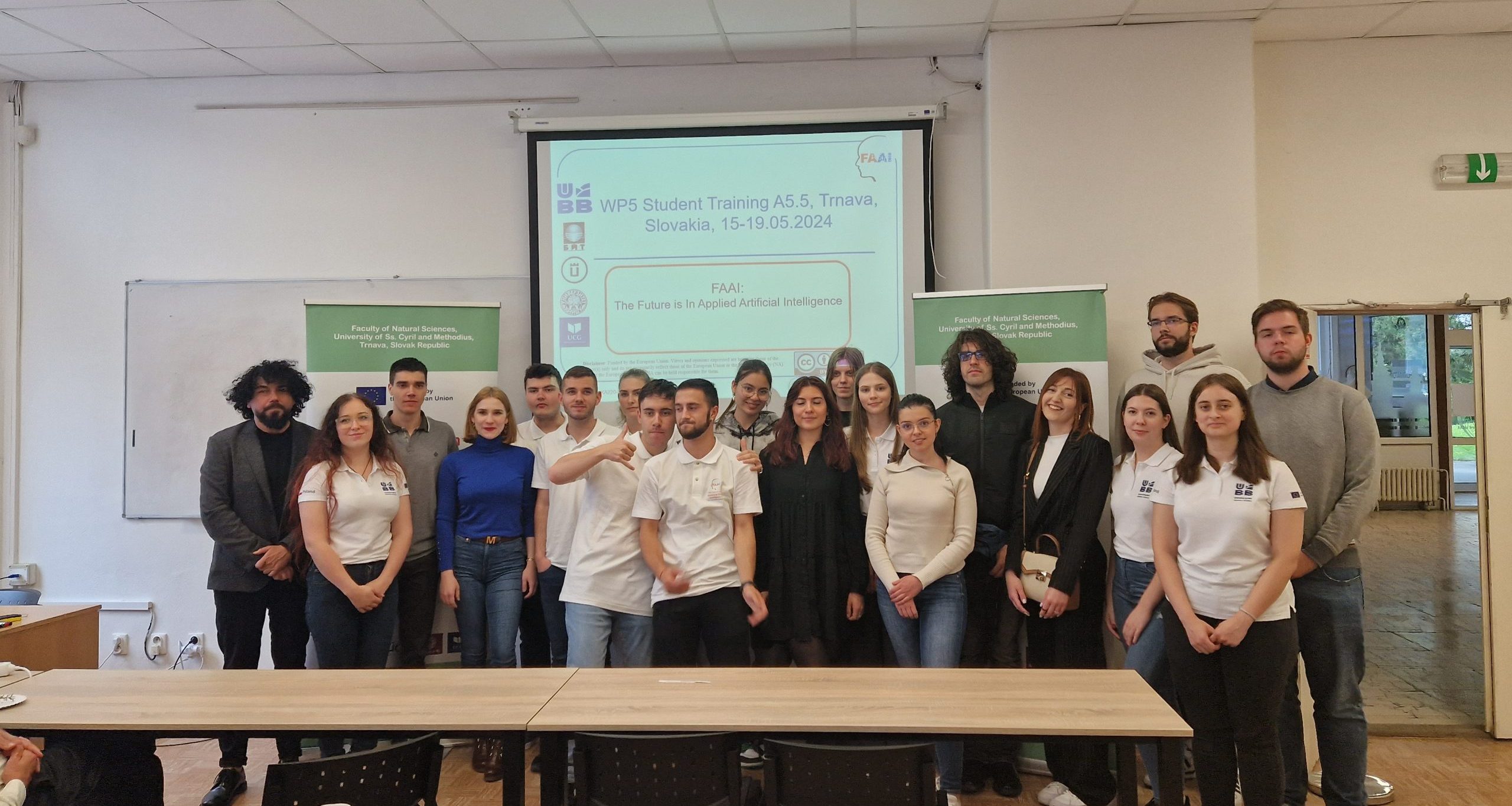
The A5.5 student training, held from May 15-19, 2024, in Trnava, Slovakia, brought together students from five partner institutions for an immersive experience in the practical applications of artificial intelligence (AI) and machine learning (ML). Organized by the University of Ss. Cyril and Methodius in Trnava, the training aimed to equip students with hands-on skills in AI across multiple domains, from industry and healthcare to ecology and smart cities.
Participating Institutions:
- University of Bielsko-Biala, Poland (UBB)
- University of Library Studies and IT, Bulgaria (ULSIT)
- The University of Niš, Serbia (UNI)
- The University of Ss. Cyril and Methodius in Trnava, Slovakia (UCMT)
- University of Montenegro, Montenegro (UoM)
Training Overview and Agenda Highlights
Over five days, students delved into various AI modules, gaining practical skills and collaborating on projects designed to address real-world challenges through AI-driven solutions. Each session, led by expert representatives from partner institutions, introduced students to AI applications in science, industry, and business, with modules covering both foundational knowledge and specialized fields.
Day 1: Opening and Foundational Modules
The training began with a welcome session by the host institution, UCMT, followed by introductions from participants. ULSIT presented an overview of the FAAI project, including its objectives and target audiences, to familiarize students with the broader context and goals of their work.
The day’s training sessions included:
- Module 1: Basic principles of AI in scientific and business applications, presented by ULSIT
- Module 2: An exploration of embeddable AI modules from major providers like IBM, Microsoft, Google, and AWS, led by UNI
- Module 3: Conducting AI-related research with practical applications, also by ULSIT
Day 2: Technical Modules and Team Collaboration
Building on foundational knowledge, Day 2 introduced students to more technical aspects:
- Module 4: Building AI-powered software applications, led by UCMT
- Module 5: Implementation of external AI modules, presented by UBB
- Module 6: AI-based solutions for ecology, highlighting AI’s potential to address environmental challenges, presented by ULSIT
The day ended with collaborative team-working sessions where students worked on project ideas, guided by mentors from UBB and UCMT.
Day 3: AI Applications in Key Sectors
Day 3 showcased AI applications across diverse sectors:
- Module 7: AI for agriculture, led by UoM, explored how AI tools are used to optimize crop production, resource management, and sustainability.
- Module 8: AI in healthcare, presented by UBB, introduced solutions for predictive diagnostics, patient monitoring, and personalized care.
- Module 9: AI solutions for smart cities, by UCMT, which highlighted how AI is transforming urban planning, transportation, and public services.
In the afternoon, students continued with their team projects, mentored by ULSIT experts.
Day 4: Industrial and Specialized AI Applications
On Day 4, students delved into industrial and robotics applications:
- Module 10: AI in industry, presented by UNI, which included AI-driven manufacturing, predictive maintenance, and automation.
- Module 11: AI in robotics, by UoM, discussed the role of AI in robotics innovation, from autonomous machines to human-robot collaboration.
- Module 12: Application of other AI modules, led by UNI, focused on lesser-known but impactful AI applications.
Afternoon team-working sessions allowed students to finalize their project concepts, with guidance from UNI and UoM.
Day 5: Project Presentations and Certificate Ceremony
The training concluded with project presentations, where student teams showcased AI solutions they had developed, applying knowledge from each module to create innovative concepts targeting specific societal or industrial challenges. Projects ranged from AI-driven environmental monitoring systems to smart city applications and personalized healthcare tools. Each presentation was followed by a brief Q&A session, allowing teams to receive feedback and suggestions from trainers and peers.
Finally, all participants received certificates of completion, celebrating their dedication, hard work, and newly acquired expertise in AI and ML.
Conclusion
The A5.5 training in Trnava provided a comprehensive introduction to AI applications for the students, equipping them with valuable skills and practical knowledge that will benefit their academic and professional pursuits. This training was not only a stepping stone in AI education but also an inspiring experience for students, allowing them to collaborate with peers across countries and apply their skills in innovative ways. The FAAI project remains committed to supporting such experiences, fostering a skilled generation of AI practitioners ready to meet the challenges of tomorrow.
